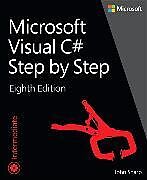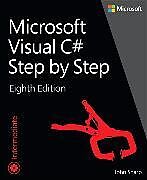Microsoft Visual C# Step by Step
Einband:
Kartonierter Einband
EAN:
9781509301041
Untertitel:
Step by Step
Genre:
Programmiersprachen
Autor:
John Sharp
Herausgeber:
Microsoft Press
Auflage:
8. Auflage
Anzahl Seiten:
816
Erscheinungsdatum:
12.11.2015
ISBN:
978-1-5093-0104-1
Autorentext
John Sharp is a principal technologist at Content Master, part of CM Group Ltd., a technical authoring and consulting company based in Gloucester, in the UK. An expert on developing Microsoft .NET applications, he has created many tutorials, white papers, and presentations on distributed systems, web services, cloud applications, and the C# language. He is the author of Windows Communication Foundation Step by Step and helped develop Microsoft Certification Course 70-480: Programming in HTML5 with JavaScript and CSS3.
Klappentext
A hands-on guide to Microsoft Visual C# fundamentals with Visual Studio 2015. Students will learn the fundamentals of programming with the latest version of Visual C# with Visual Studio 2015. Experienced software developers will get all the guidance, exercises, and code they need to start building responsive, scalable Windows 10 and Universal Windows Platform applications with Visual C#.
Inhalt
Introduction xix
PART I: INTRODUCING MICROSOFT VISUAL C# AND MICROSOFT VISUAL STUDIO 2015
Chapter 1: Welcome to C# 3
Beginning programming with the Visual Studio 2015 environment 3
Writing your first program 8
Using namespaces 14
Creating a graphical application 17
Examining the Universal Windows Platform app 26
Adding code to the graphical application 29
Summary 32
Quick Reference 32
Chapter 2: Working with variables, operators, and expressions 33
Understanding statements 33
Using identifiers 34
Identifying keywords 34
Using variables 36
Naming variables 36
Declaring variables 37
Working with primitive data types 37
Unassigned local variables 38
Displaying primitive data type values 38
Using arithmetic operators 45
Operators and types 45
Examining arithmetic operators 47
Controlling precedence 52
Using associativity to evaluate expressions 53
Associativity and the assignment operator 53
Incrementing and decrementing variables 54
Prefix and postfix 55
Declaring implicitly typed local variables 56
Summary 57
Quick Reference 58
Chapter 3: Writing methods and applying scope 59
Creating methods 59
Declaring a method 60
Returning data from a method 61
Using expression-bodied methods 62
Calling methods 63
Applying scope 66
Defining local scope 66
Defining class scope 67
Overloading methods 68
Writing methods 68
Using optional parameters and named arguments 77
Defining optional parameters 79
Passing named arguments 79
Resolving ambiguities with optional parameters and named arguments 80
Summary 85
Quick reference 86
Chapter 4: Using decision statements 87
Declaring Boolean variables 87
Using Boolean operators 88
Understanding equality and relational operators 88
Understanding conditional logical operators 89
Short circuiting 90
Summarizing operator precedence and associativity 90
Using if statements to make decisions 91
Understanding if statement syntax 91
Using blocks to group statements 93
Cascading if statements 94
Using switch statements 99
Understanding switch statement syntax 100
Following the switch statement rules 101
Summary 104
Quick reference 105
Chapter 5: Using compound assignment and iteration statements 107
Using compound assignment operators 107
Writing while statements 108
Writing for statements 114
Understanding for statement scope 115
Writing do statements 116
Summary 125
Quick reference 125
Chapter 6: Managing errors and exceptions 127
Coping with errors 127
Trying code and catching exceptions 128
Unhandled exceptions 129
Using multiple catch handlers 130
Catching multiple exceptions 131
Propagating exceptions 136
Using checked and unchecked integer arithmetic 138
Writing checked statements 139
Writing checked expressions 140
Throwing exceptions 143
Using a finally block 148
Summary 149
Quick reference 150
PART II: UNDERSTANDING THE C# OBJECT MODEL
Chapter 7: Creating and managing classes and objects 153
Understanding classification 153
The purpose of encapsulation 154
Defining and using a class 154
Controlling accessibility 156
Working with constructors 157
Overloading constructors 158
Understanding static methods and data 167
Creating a shared field 168
Creating a static field by using the const keyword 169
Understanding static classes 169
Static using statements 170
Anonymous classes 172
Summary 174
Quick reference 174
Chapter 8: Understanding values and references 177
Copying value type variables and classes 177
Understanding null values and nullable types 183
Using nullable types 185
Understanding the properties of nullable types 186
Using ref and out parameters 187
Creating ref parameters 188
Creating out parameters 188
How computer memory is organized 190
Using the stack and the heap 192
The System.Object class 193
Boxing 194
Unboxing 194
Casting data safely 196
The is operator …

Leider konnten wir für diesen Artikel keine Preise ermitteln ...
billigbuch.ch sucht jetzt für Sie die besten Angebote ...
Die aktuellen Verkaufspreise von 6 Onlineshops werden in Realtime abgefragt.
Sie können das gewünschte Produkt anschliessend direkt beim Anbieter Ihrer Wahl bestellen.
Loading...
Die aktuellen Verkaufspreise von 6 Onlineshops werden in Realtime abgefragt.
Sie können das gewünschte Produkt anschliessend direkt beim Anbieter Ihrer Wahl bestellen.
| # | Onlineshop | Preis CHF | Versand CHF | Total CHF | ||
|---|---|---|---|---|---|---|
| 1 | Seller | 0.00 | 0.00 | 0.00 |
